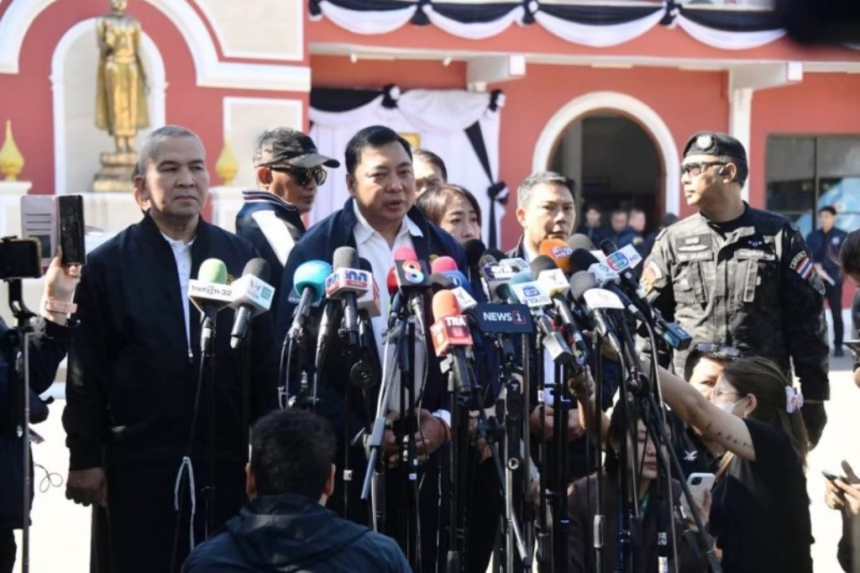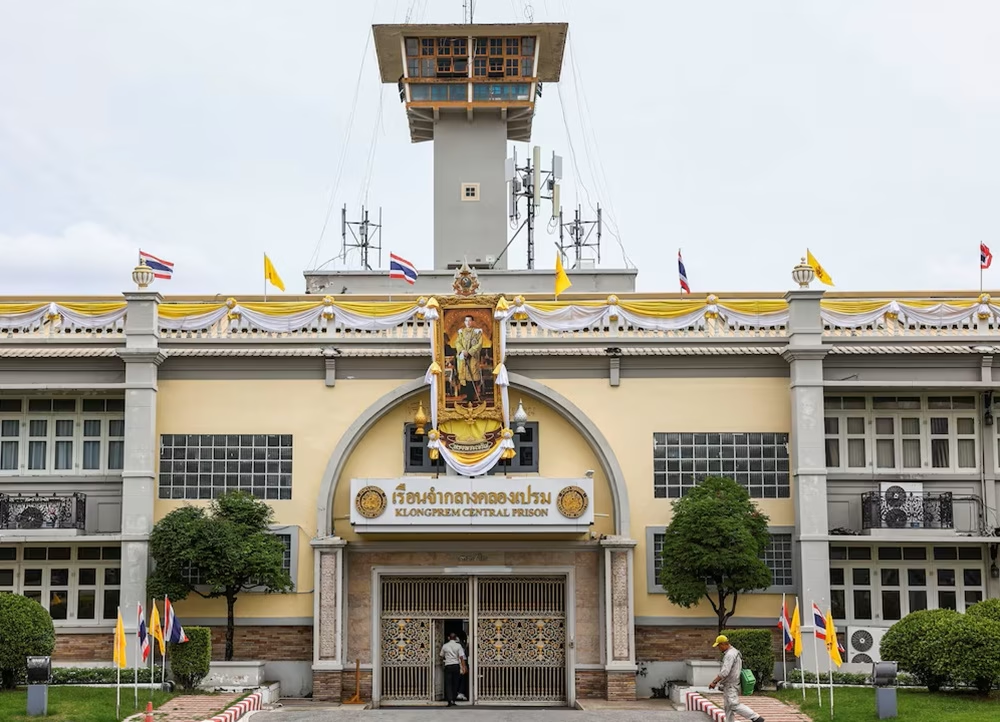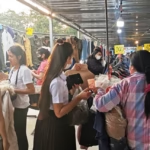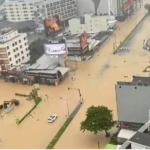BANGKOK – The head of the Department of Corrections told a press briefing that around 20 officials are under investigation for arranging VIP treatment, including access to prostitutes, for Chinese inmates at Bangkok Remand Prison.
Pol Lt Col Prawut Wongsinin made the statement after he and Justice Minister Rutthapon Naowarat inspected the prison in Chatuchak district on Saturday.
The justice minister said the Department of Special Investigation (DSI) would lead the inquiry. He was accompanied by Pol Maj Gen Yutthana Praedam, director-general of the DSI, and his deputy, Pol Lt Col Anurak Rojnirankit.
Pol Lt Col Prawut said he received reports of serious misconduct by prison officers about a month after he became corrections chief on 1 October. He said he passed the information on to his superiors.
After almost three weeks of collecting evidence, investigators confirmed that around 20 officials, both senior and junior, had broken regulations and were involved in the scheme, he said.
Investigators also found evidence that women had been entering the prison to provide sexual services.
During a raid on 16 November, officers found two women in their early twenties inside the prison. One was discovered alone with a Chinese inmate in a hidden room, while the other waited upstairs.
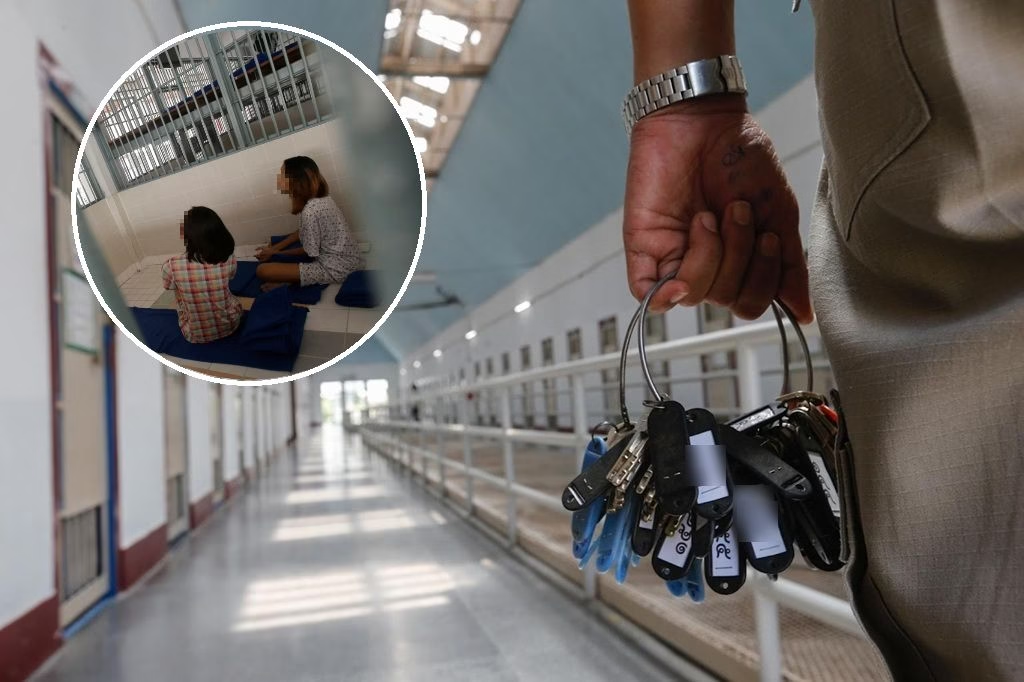
Secret Rooms for Sex Parties
Officials struggled to gain entry to the secret room because it was secured by two locked doors. The women were dressed up and both denied working as sex workers when questioned, Pol Lt Col Prawut said. However, officers found condoms, lingerie, stained tissues, traces of bodily fluids on a sofa, along with tobacco and alcohol.
Forensic officers are scheduled to examine the room on Monday. Pol Lt Col Prawut added that staff believed to be involved had already been moved away from the area.
He said Thai police had no legal grounds to detain the two women at that time because the facts were still unclear. They have since returned to China. Thai authorities will work with Chinese officials to blacklist them if evidence shows they have committed a crime.
Pol Lt Col Prawut said CCTV footage reviewed during the probe suggested that Chinese women had been entering the prison every Sunday. Some video files had been deleted, he added. The raid last Sunday also uncovered mobile phones, lighters, portable air conditioning units, a refrigerator, and a microwave oven inside the prison.
Prime Minister Anutin Charnvirakul stated on Friday that strict action would be taken against any officials who granted illegal privileges to Chinese inmates.
The Department of Corrections has already transferred several Chinese prisoners from Bangkok Remand Prison to another facility that it considers more suitable. More than ten others remain in their original ward, but Pol Lt Col Prawut said more transfers would follow if further wrongdoing is found.
Brief history of Bangkok Remand Prison (the “Bangkok Hilton”)
Bangkok Remand Prison, often nicknamed the “Bangkok Hilton“ by foreign media and travellers, is known for harsh conditions that stand in stark contrast to the luxury Hilton hotel chain. The complex is officially called Klong Prem Central Prison (Thai: เรือนจำกลางคลองเปรม) in its current form, although the terms “Bangkok Remand Prison” and “Bangkok Hilton” usually refer to the older section used for remand prisoners and many foreign inmates.
Bangkok Remand Prison Key timeline
- 1890s to 1900s: The origins of the complex trace back to Bang Kwang Central Prison, which opened in 1902 during the reign of King Chulalongkorn (Rama V) in Nonthaburi province, just north of central Bangkok. It was built for serious offenders and prisoners on death row.
- 1930s: A separate facility, Klong Prem Prison, was established nearby to ease overcrowding. Over time, both prisons were brought under one administration and became known together as the Klong Prem Prison Complex.
- Post Second World War to 1970s: After the Vietnam War and the rise of the Southeast Asian drug trade, the prison began to receive large numbers of Western drug offenders. Many were sentenced under Thailand’s strict narcotics laws to terms of 25 to 100 years or death. Conditions were, and in many ways still are, extremely harsh, with overcrowded cells, shackles on death row and long-term inmates, intense heat, poor sanitation, and basic medical care.
- 1980s to 1990s: The prison gained worldwide attention through books and media coverage.
- The phrase “Bangkok Hilton” gained popularity through Australian journalist Sandra Gregory and her 1995 book Forget You Had a Daughter, and even more through the 1989 Australian TV mini-series Bangkok Hilton starring Nicole Kidman, although the show was fictional.
- High-profile cases involved Australian drug traffickers linked in the public mind to the “Bali Nine”, British prisoners, and many Western backpackers arrested with drugs at Don Mueang and the old Bangkok airport.
- 1990s to 2000s: The remand section, where prisoners wait for trial or sentencing, became notorious as a holding place for foreign inmates. Death row prisoners were kept in leg irons for life until reforms in 2003 under Prime Minister Thaksin Shinawatra reduced the use of shackles. Now, prisoners are usually shackled only for the first three months or if they are considered high risk.
- Present day (2025): The complex is still officially named Klong Prem Central Prison. The old “Bangkok Hilton” remand building is still in operation, although some areas have been renovated. The complex holds around 20,000 inmates, far above its original design capacity of about 8,000 to 10,000. It is still seen as one of the most feared prisons in Thailand, although conditions have improved slightly due to international pressure and occasional royal pardons.
In popular culture, “Bangkok Hilton” has become a general term for a brutal Thai prison experience, even though Bang Kwang (the main death row prison) and Klong Prem are technically separate facilities that sit next to each other.
Despite gradual reforms and some improvements, Klong Prem Central Prison continues to be viewed as one of the toughest prisons in Southeast Asia.




